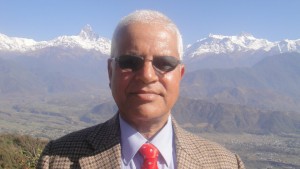Nepalese ELT field has owned many dedicated trainers, supervisors, and teachers helping hundreds of thousands of students, growing professionally and helping others grow professionally. They have been serving the nation by teaching English and contributing through the institutions they have been involved in.

Prithvi Narayan Campus Pokhara
One of such personalities is Mr. Bishnu Hari Timilsina, Associate Professor of English Education at Prithvi Narayan Campus Pokhara, a constituent campus of Tribhuvan University. He has been teaching English for more than three and a half decades. He also served as Secondary School Supervisor for about seven years before he began his teaching career at the university. Rajan Kumar Kandel, Choutari editor and coordinator for April Issue had an interview with him regarding his professional journey and experiences in the field of ELT.
Please go through the interview and leave comments on the issues raised. Your words may provide a sense of gratitude to the dedicated teachers who have devoted their whole lives in the field of English language teaching and encourage the novice and potential professionals.
Rajan: Welcome to the April issue of ELT Choutari, Sir! First of all, I would like to ask you to highlight your ELT journey and your experiences of teaching English from school to college level.
Mr. Timilsina: Thank you Rajan Jee and the Choutari team for inviting me to the interview of ELT Choutari to share my experiences in EFL classroom. I am very happy to express my ideas through your popular web magazine. I taught in secondary schools for about 15 years and I have been teaching in campus level for more than 20 years.
You are the founding Chair of NELTA Surkhet and could you please share with us about your recent involvement with NELTA and such other ELT related professional organizations?
Yes, I was the founding chair of NELTA Surkhet in 1996. We tried our best to organize English teachers of Surkhet and develop them professionally during our tenure. I’m the Life Member of NELTA, and involved in NELTA activities here in Pokhara. I’m not holding any leading role of NELTA recently.
How do you evaluate the condition of English language teaching in Nepal now and then?
Now, the ELT situation has improved in Nepal. New approaches, methods, and techniques of language teaching have been developed and practiced. We can see its reflection in Nepalese ELT as well. As a whole, it is not frustrating though we have to improve many things.
Do you think that teaching and learning English are still not encouraged very much in Nepal?
No. I don’t think so. However, there are places in Nepal where learners are not getting enough opportunities. Most of the schools in Nepal are still not informed of the new teaching methods because of many problems. They are not equipped with ELT resources including sufficient and trained English teachers. The situation should be improved.
How could an experienced English teacher contribute empowering novice ELT practitioners throughout the country?
Obviously, experienced English teachers can contribute empowering novice ELT practitioners by bringing them into exposure through such professional networks. We can do it by integrative and intrinsic motivation and strategic investment to the novice learners. We can just show them to the vast storehouse of knowledge for professional development. They do rest of the things themselves.
Choutari team has used approaches, platforms, and talents of its members and ELT experts in pursuing professional development of ELT practitioners. Do you think such volunteer initiatives can contribute cooperative learning and sharing among ELT professionals?
Sure. Volunteer initiatives can contribute professional development and cooperative learning. We can share experiences and enhance our teaching and learning with the help of such platforms. ELT Choutari has contributed a lot to its readers to search the sources of knowledge and get acquainted with the activities, studies, and practices of the practitioners in the field.
What would you like to tell the readers of Choutari about how they can support this or similar volunteer initiative to develop oneself and let others develop professionally?
I think the learners should be active to develop their professionalism. They should initiate their journey of learning themselves. If we are doing something new, we should know what the other people are doing/saying on it. In this regard, Choutari can be a good platform on it.
Which Choutari article or interview that you have read in the past six years did you like most and why?
I like most of them as they had many interesting ideas and experiences. Mostly, I like those that have explored the current issues of ELT. So, I cannot be very much specific to select one or two. Many of them are useful to the ELT practitioners.
Please suggest any areas of professional conversation that Choutari is yet to pay attention to.
In spite of the fact that it is difficult to prepare a matter that fits to all, we can provide creative, learners friendly and academic subject matter in it. Choutari can also include the materials that are equally helpful to the teachers teaching the beginners as well as the advanced learners.
Finally, would you like to convey any message to Choutari readers?
Teaching and learning are give and take processes. So, give your experiences to Choutari and take some from it. Sharing experiences enhances both teaching and learning. Sharing is important in the field of English language teaching too. Platforms like Choutari can also be used for building rapport among the ELT practitioners experienced and novice, and home and abroad. It can build a professional network.
Thank you Rajan G for your beautiful academic deed which has provided a platform to share opinions and experiences of teachers regarding language teaching and learning practice. I really appreciate your academic endeavour and wish your continuous successful deeds in days to come.
Thank you Resham G for your encouraging words.